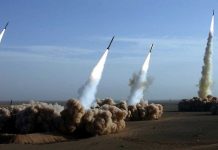By Mark Saunokonoko, 9 NEWS. This story appears on PACNEWS
The South Pacific has become an increasingly important geopolitical chessboard with the United States, China and Australia racing to secure ports, cyber infrastructure and potential military bases in a number of small but strategic island nations.
Over the past 12 months, the governments of Vanuatu, Fiji, Papua New Guinea and the Solomon Islands have all been wooed and seduced by Canberra, Washington and Beijing to the tune of hundreds of millions of dollars.
Adam Ni, a policy researcher at Australian National University’s Strategic and Defence Studies Centre, said it is inevitable that these Pacific nations, whose allegiance has long been taken for granted, will be sucked into China’s mighty orbit from out of Australia’s backyard.
Ni predicts Australia’s international diplomacy will be strained and put to the test in this new era of South Pacific posturing, as Canberra attempts to delicately balance vital strategic, military and trade ties to superpowers, the US and China.
“As China expands outward, with a military presence and economically, the Pacific will acquire a never-before seen importance,” Ni told nine.com.au.
“If you look at Chinese investment … you see a trend where China is increasingly becoming more influential in the Pacific.”
Ni said China’s economic footholds in the Pacific and investment in massive infrastructure projects, such as ports, can over time evolve into a military outpost.
Last year China opened its first foreign military base in Djibouti, the small African country situated on the Horn of Africa.
The military base grew out of a joint Djibouti-China commercial port, launched only two months earlier.
A large Sri Lankan port, big enough to hold huge warships, has also come under Chinese control. Both Djibouti and Sri Lanka had fallen into heavy financial debt to China. Earlier this year China denied it was seeking to establish a military base in Vanuatu.
Strategic Move
Global maritime dominance is vital for China. Djibouti sits right on a crucial shipping lane choke point, the Bab el-Mandeb Strait. Sri Lanka’s giant Hambantota port, now operated by China on a 99-year lease, offers strategic access to India, the Middle East, Africa, Asia and Australia’s west and northern coast. The US is known to be rattled by such developments.
Ahead of last week’s APEC conference in Papua New Guinea, Zheng Zeguang, vice-minister of the Chinese foreign ministry, made Beijing’s position and outlook in the South Pacific clear.
“The cooperation and aids we provide in the island nations are not targeting any third parties,” Zheng told reporters, before issuing a further proclamation.
“Any country should not stop China’s friendly cooperation and communication with island nations – and of course they could not stop such cooperation and communication.”
Near the conclusion of the APEC conference, Australia announced it, along with the US, will develop a naval base in Papua New Guinea.
The PNG naval base is just the latest sign of great power competition in the South Pacific. A number of significant moves have already been played this year, and the Pacific islands, now squarely in the middle of this tug of war, have reaped the benefits.
In June, the Australian government confirmed it would spend $200 million (US$144 million) to fund submarine cables and a cyber security centre for the Solomon Islands, trumping Chinese ambitions. Some analysts believed the scuppered bid from Chinese telecom giant Huawei, which would have connected the Solomons and PNG to Sydney with an undersea cable, could have threatened Australia’s cyber security.
Similarly, in April Fairfax reported high-level discussions had taken place between Washington and Canberra over reports, denied by Beijing, that China was seeking to build a military base in Vanuatu, located less than 2000km from Australia.
At the time, then prime minister Malcolm Turnbull said Australia “would view with great concern the establishment of any foreign military bases in those Pacific Island countries and neighbours of ours.”
Vanuatu’s links with China have strengthened in recent years, with the small island nation receiving hundreds of millions of dollars in Chinese development money.
Vanuatu is known to have backed China’s position on the disputed South China Sea. The US has raised concerns over what it claims are loans issued by China which come with strings attached, and can end with that nation beholden to Chinese ambitions.
Several months after the Vanuatu issue had spiked Turnbull’s pulse rate, Fiji was suddenly thrust onto the radar. Australia and China faced off with competing bids to develop a Fijian military base in Nadi called Black Rock.
The Black Rock base will act as a regional hub for Fiji’s police and peacekeeping training and pre-deployment preparation.
Keen to show their commitment, in the lead up to the Fijian government selecting a winning bid, Australia gave the Fiji navy a patrol boat. Similarly, China gifted the Fijian navy a surveillance and hydrographic vessel.
It appears, at least for the immediate future, Pacific nations can expect government officials to arrive bearing gifts. This year China announced it will be donate a frigate warship to Sri Lanka and four patrol boats to the Philippines navy.
In one of Malcolm Turnbull’s final acts as prime minister, he announced Australia would be fully funding the development of Black Rock. A year earlier, Australia had pledged $2m (US$1.4 million) to the base. During a media briefing in October, Australia’s Department of Defence would not comment on what defence assets or troops might be deployed to Nadi.
Ni said it is obvious that Australia cannot hope to keep outbidding China in the Pacific.
“Australia’s resources are limited, so they have to be very smart as to where they put these resources,” he said. “We have to be creative how we engage with these small Pacific countries.”
According to him, Canberra will need to embrace a competitive and co-operative approach.
“You can’t just have a confrontational approach alone,” he said. “That would mean you are viewing the world through zero-sum eyes, and simply trying to do everything to decrease China’s power.”
Growing power
Under president Xi Jinping’s rule, China has steadily rolled out its ambitious Belt and Road Initiative (BRI).
The BRI, also known as One Belt, One Road, seeks to promote co-operation along five corridors out of China: land routes through Central Asia to Europe; to the Middle East, and Southeast Asia; and sea routes connecting Chinese ports to Europe and to the South Pacific.
Among other strategies, the BRI involves huge investment in infrastructure including ports, rail, bridges, oil and gas pipelines.
China’s growing naval power is vital to protecting its trading and BRI ambitions.
“[China] has to guard its investment and expanding footprint,” Ni said.
“To project that kind of power, you need a powerful navy. You need an expeditionary force to be able to move troops overseas. Forward bases and foreign ports are vital,” he said.







